Class type to contains a value (of type ValueType), or an error (of type ErrorType) More...
#include <result.h>
Public Types | |
| using | value_type = T |
| Type alias for the type T of values. More... | |
| using | error_type = E |
| Type alias for the type E of errors. More... | |
Public Member Functions | |
| constexpr | Result (const T &t) noexcept |
| Construct a new Result from the specified value (given as lvalue) More... | |
| constexpr | Result (T &&t) noexcept |
| Construct a new Result from the specified value (given as rvalue) More... | |
| constexpr | Result (const E &e) noexcept |
| Construct a new Result from the specified error (given as lvalue) More... | |
| constexpr | Result (E &&e) noexcept |
| Construct a new Result from the specified error (given as rvalue) More... | |
| Result (const Result &other)=default | |
| Copy-construct a new Result from another instance. More... | |
| Result & | operator= (const Result &other)=default |
| Copy-assign another Result to this instance. More... | |
| Result (Result &&other) noexcept(std::is_nothrow_move_constructible< T >::value &&std::is_nothrow_move_constructible< E >::value)=default | |
| Move-construct a new Result from another instance. More... | |
| Result & | operator= (Result &&other) noexcept(std::is_nothrow_move_constructible< T >::value &&std::is_nothrow_move_assignable< T >::value &&std::is_nothrow_move_constructible< E >::value &&std::is_nothrow_move_assignable< E >::value)=default |
| Move-assign another Result to this instance. More... | |
| ~Result () noexcept=default | |
| Destruct an instance of Result. More... | |
| template<typename... Args> | |
| void | EmplaceValue (Args &&...args) noexcept |
| Put a new value into this instance, constructed in-place from the given arguments. More... | |
| template<typename... Args> | |
| void | EmplaceError (Args &&...args) noexcept |
| Put a new error into this instance, constructed in-place from the given arguments. More... | |
| bool | HasValue () const noexcept |
| Check whether *this contains a value. More... | |
| operator bool () const noexcept | |
| Check whether *this contains a value. More... | |
| const T & | operator* () const &noexcept |
| Access the contained value. More... | |
| T && | operator* () &&noexcept |
| Access the contained value. More... | |
| const T * | operator-> () const noexcept |
| Access the contained value. More... | |
| const T & | Value () const &noexcept |
| Access the contained value. More... | |
| T && | Value () &&noexcept |
| Access the contained value. More... | |
| const E & | Error () const &noexcept |
| Access the contained error. More... | |
| E && | Error () &&noexcept |
| Access the contained error. More... | |
| std::optional< T > | Ok () const &noexcept |
| Return the contained value as an Optional. More... | |
| std::optional< T > | Ok () &&noexcept |
| Return the contained value as an Optional. More... | |
| std::optional< E > | Err () const &noexcept |
| Return the contained error as an Optional. More... | |
| std::optional< E > | Err () &&noexcept |
| Return the contained error as an Optional. More... | |
| template<typename F , typename R2 = typename std::invoke_result_t<F, value_type &&>> | |
| auto | AndThen (F &&fn) &&noexcept -> R2 |
| Returns the result of the given function on the contained value if it exists; otherwise, returns the result itself. More... | |
| template<typename F , typename E2 = std::invoke_result_t<F, E>> | |
| Result< T, E2 > | MapError (F &&fn) |
| Returns the result of the given function on the contained value if it exists; otherwise, returns the result itself. More... | |
| template<typename F > | |
| Result | OrElse (F &&fn) &&noexcept |
| Returns the result itself if it contains a value; otherwise, returns the result of the given function on the error value. More... | |
| template<typename U > | |
| T | ValueOr (U &&defaultValue) const &noexcept |
| Return the contained value or the given default value. More... | |
| template<typename U > | |
| T | ValueOr (U &&defaultValue) &&noexcept |
| Return the contained value or the given default value. More... | |
| template<typename G > | |
| E | ErrorOr (G &&defaultError) const &noexcept |
| Return the contained error or the given default error. More... | |
| template<typename G > | |
| E | ErrorOr (G &&defaultError) &&noexcept |
| Return the contained error or the given default error. More... | |
| template<typename F > | |
| T | Resolve (F &&f) const |
| Return the contained value or return the result of a function call. More... | |
Static Public Member Functions | |
| static Result | FromValue (T &t) noexcept |
| Build a new Result from the specified value (given as lvalue) More... | |
| static Result | FromValue (T &&t) noexcept |
| Build a new Result from the specified value (given as rvalue) More... | |
| template<typename... Args> | |
| static Result | FromValue (Args &&...args) noexcept |
| Build a new Result from a value that is constructed in-place from the given arguments. More... | |
| static Result | FromError (const E &e) noexcept |
| Build a new Result from the specified error (given as lvalue) More... | |
| static Result | FromError (E &&e) noexcept |
| Build a new Result from the specified error (given as rvalue) More... | |
| template<typename... Args> | |
| static Result | FromError (Args &&...args) noexcept |
| Build a new Result from an error that is constructed in-place from the given arguments. More... | |
Private Attributes | |
| std::variant< T, E > | storage_ |
| Storage to contain value of type T or error of type E. More... | |
Detailed Description
template<typename T, typename E = ErrorCode>
class core_type::Result< T, E >
Class type to contains a value (of type ValueType), or an error (of type ErrorType)
This class is implemented based on API specification of ara::core::Result from Adaptive Platform Core AUTOSAR AP R21-11
- Template Parameters
-
T The type of value E The type of error
Member Typedef Documentation
◆ error_type
| using core_type::Result< T, E >::error_type = E |
◆ value_type
| using core_type::Result< T, E >::value_type = T |
Constructor & Destructor Documentation
◆ Result() [1/6]
|
inlineexplicitconstexprnoexcept |
Construct a new Result from the specified value (given as lvalue)
- Parameters
-
[in] t The value to put into the Result
Definition at line 116 of file result.h.
◆ Result() [2/6]
|
inlineexplicitconstexprnoexcept |
◆ Result() [3/6]
|
inlineexplicitconstexprnoexcept |
◆ Result() [4/6]
|
inlineexplicitconstexprnoexcept |
◆ Result() [5/6]
|
default |
Copy-construct a new Result from another instance.
- Parameters
-
[in] other The other instance
◆ Result() [6/6]
|
defaultnoexcept |
Move-construct a new Result from another instance.
- Parameters
-
[in] other The other instance
◆ ~Result()
|
defaultnoexcept |
Destruct an instance of Result.
Member Function Documentation
◆ AndThen()
|
inlinenoexcept |
Returns the result of the given function on the contained value if it exists; otherwise, returns the result itself.
- Template Parameters
-
F Functor type
- Parameters
-
[in] fn Callable function
Definition at line 329 of file result.h.
References core_type::Result< T, E >::HasValue().

◆ EmplaceError()
|
inlinenoexcept |
Put a new error into this instance, constructed in-place from the given arguments.
- Template Parameters
-
Args The types of arguments given to this function
- Parameters
-
[in] args The arguments used for constructing the error
Definition at line 200 of file result.h.
References core_type::Result< T, E >::storage_.
◆ EmplaceValue()
|
inlinenoexcept |
Put a new value into this instance, constructed in-place from the given arguments.
- Template Parameters
-
Args The types of arguments given to this function
- Parameters
-
[in] args The arguments used for constructing the value
Definition at line 188 of file result.h.
References core_type::Result< T, E >::storage_.
◆ Err() [1/2]
|
inlinenoexcept |
Return the contained error as an Optional.
- Returns
- std::optional<E> An Optional with the error, if present
Definition at line 312 of file result.h.
References core_type::Result< T, E >::Error(), and core_type::Result< T, E >::HasValue().

◆ Err() [2/2]
|
inlinenoexcept |
Return the contained error as an Optional.
- Returns
- std::optional<E> An Optional with the error, if present
Definition at line 301 of file result.h.
References core_type::Result< T, E >::Error(), and core_type::Result< T, E >::HasValue().

◆ Error() [1/2]
|
inlinenoexcept |
Access the contained error.
This function’s behavior is undefined if *this does not contain an error
- Returns
- E && An rvalue reference to the contained error
Definition at line 272 of file result.h.
References core_type::Result< T, E >::storage_.
◆ Error() [2/2]
|
inlinenoexcept |
Access the contained error.
This function’s behavior is undefined if *this does not contain an error
- Returns
- const E & A const reference to the contained error
Definition at line 264 of file result.h.
References core_type::Result< T, E >::storage_.
Referenced by core_type::Result< void, E >::CheckError(), core_type::Result< T, E >::Err(), core_type::Result< void, E >::Err(), core_type::Result< void, E >::MapError(), core_type::Result< void, E >::OrElse(), core_type::Result< T, E >::Resolve(), and core_type::Result< void, E >::Resolve().
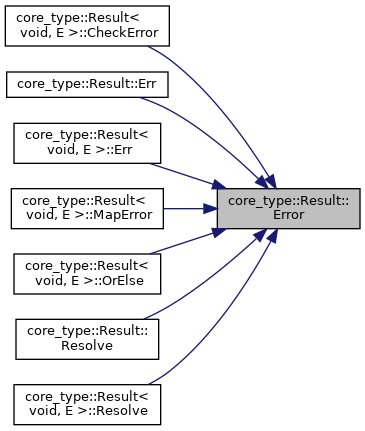
◆ ErrorOr() [1/2]
|
inlinenoexcept |
Return the contained error or the given default error.
If *this contains an error, it is returned. Otherwise, the specified default error is returned, static_cast’d to E
- Template Parameters
-
G The type of defaultError
- Parameters
-
[in] defaultError The error to use if *this does not contain an error
- Returns
- E The error
Definition at line 421 of file result.h.
References core_type::Result< T, E >::HasValue().

◆ ErrorOr() [2/2]
|
inlinenoexcept |
Return the contained error or the given default error.
If *this contains an error, it is returned. Otherwise, the specified default error is returned, static_cast’d to E
- Template Parameters
-
G The type of defaultError
- Parameters
-
[in] defaultError The error to use if *this does not contain an error
- Returns
- E The error
Definition at line 406 of file result.h.
References core_type::Result< T, E >::HasValue().

◆ FromError() [1/3]
|
inlinestaticnoexcept |
Build a new Result from an error that is constructed in-place from the given arguments.
This function shall not participate in overload resolution unless: std::is_const Args&&...>::value is true, and the first type of the expanded parameter pack first type of the expanded parameter pack is not a specialization of Result
- Template Parameters
-
Args The types of arguments given to this function
- Parameters
-
[in] args The arguments used for constructing the error
◆ FromError() [2/3]
|
inlinestaticnoexcept |
Build a new Result from the specified error (given as lvalue)
- Parameters
-
[in] e The error to put into the Result
Definition at line 83 of file result.h.
Referenced by diag::client::conversation::DmConversation::SendDiagnosticRequest(), and diag::client::conversation::Conversation::SendDiagnosticRequest().

◆ FromError() [3/3]
|
inlinestaticnoexcept |
◆ FromValue() [1/3]
|
inlinestaticnoexcept |
Build a new Result from a value that is constructed in-place from the given arguments.
This function shall not participate in overload resolution unless: std::is_constructible<T, Args&&...>::value is true, and the first type of the expanded parameter pack is not T, and the first type of the expanded parameter pack is not a specialization of Result
- Template Parameters
-
Args The types of arguments given to this function
- Parameters
-
[in] args The arguments used for constructing the value
◆ FromValue() [2/3]
|
inlinestaticnoexcept |
◆ FromValue() [3/3]
|
inlinestaticnoexcept |
Build a new Result from the specified value (given as lvalue)
- Parameters
-
[in] t The value to put into the Result
Definition at line 48 of file result.h.
Referenced by diag::client::DiagClient::DiagClientImpl::Initialize(), boost_support::connection::tcp::TcpConnection< ConnectionType::kClient, Socket >::ReadMessage(), boost_support::connection::tcp::TcpConnection< ConnectionType::kServer, Socket >::ReadMessage(), boost_support::connection::tcp::TcpConnection< ConnectionType::kClient, Socket >::Transmit(), boost_support::connection::tcp::TcpConnection< ConnectionType::kServer, Socket >::Transmit(), and boost_support::connection::udp::UdpConnection< Socket >::Transmit().
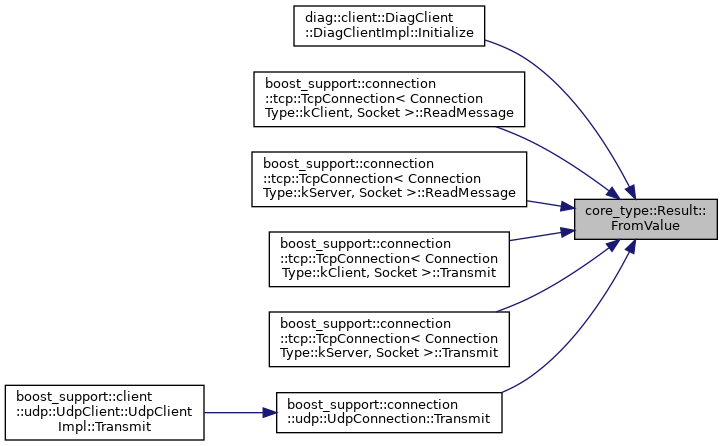
◆ HasValue()
|
inlinenoexcept |
Check whether *this contains a value.
- Returns
- bool True if *this contains a value, false otherwise
Definition at line 209 of file result.h.
References core_type::Result< T, E >::storage_.
Referenced by core_type::Result< void, E >::AndThen(), core_type::Result< T, E >::AndThen(), core_type::Result< void, E >::CheckError(), core_type::Result< T, E >::Err(), core_type::Result< void, E >::Err(), core_type::Result< T, E >::ErrorOr(), core_type::Result< void, E >::ErrorOr(), core_type::Result< T, E >::MapError(), core_type::Result< void, E >::MapError(), core_type::Result< T, E >::Ok(), core_type::Result< T, E >::operator bool(), core_type::Result< void, E >::operator bool(), core_type::Result< T, E >::OrElse(), core_type::Result< void, E >::OrElse(), core_type::Result< T, E >::Resolve(), and core_type::Result< T, E >::ValueOr().
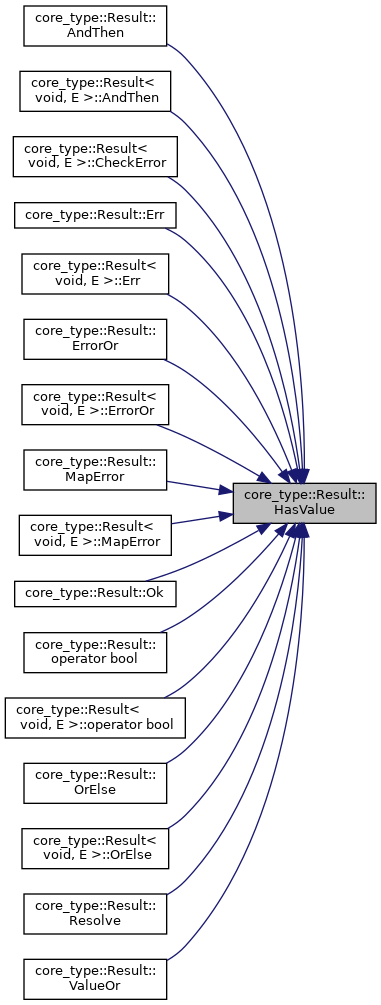
◆ MapError()
|
inline |
Returns the result of the given function on the contained value if it exists; otherwise, returns the result itself.
- Template Parameters
-
F Functor type
- Parameters
-
[in] fn Callable function
Definition at line 345 of file result.h.
References core_type::Result< T, E >::HasValue(), and core_type::Result< T, E >::Value().
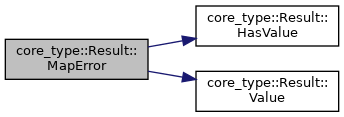
◆ Ok() [1/2]
|
inlinenoexcept |
Return the contained value as an Optional.
- Returns
- std::optional<T> An Optional with the value, if present
Definition at line 290 of file result.h.
References core_type::Result< T, E >::HasValue(), and core_type::Result< T, E >::Value().

◆ Ok() [2/2]
|
inlinenoexcept |
Return the contained value as an Optional.
- Returns
- std::optional<T> An Optional with the value, if present
Definition at line 279 of file result.h.
References core_type::Result< T, E >::HasValue(), and core_type::Result< T, E >::Value().

◆ operator bool()
|
inlineexplicitnoexcept |
Check whether *this contains a value.
- Returns
- bool True if *this contains a value, false otherwise
Definition at line 216 of file result.h.
References core_type::Result< T, E >::HasValue().

◆ operator*() [1/2]
|
inlinenoexcept |
Access the contained value.
This function’s behavior is undefined if *this does not contain a value
- Returns
- T && An rvalue reference to the contained value
Definition at line 232 of file result.h.
References core_type::Result< T, E >::storage_.
◆ operator*() [2/2]
|
inlinenoexcept |
Access the contained value.
This function’s behavior is undefined if *this does not contain a value
- Returns
- const T & A const_reference to the contained value
Definition at line 224 of file result.h.
References core_type::Result< T, E >::storage_.
◆ operator->()
|
inlinenoexcept |
Access the contained value.
This function’s behavior is undefined if *this does not contain a value
- Returns
- const T * A pointer to the contained value
Definition at line 240 of file result.h.
References core_type::Result< T, E >::storage_.
◆ operator=() [1/2]
|
default |
◆ operator=() [2/2]
|
defaultnoexcept |
◆ OrElse()
|
inlinenoexcept |
Returns the result itself if it contains a value; otherwise, returns the result of the given function on the error value.
- Template Parameters
-
F Functor type
- Parameters
-
[in] fn Callable function
Definition at line 361 of file result.h.
References core_type::Result< T, E >::HasValue().

◆ Resolve()
|
inline |
Return the contained value or return the result of a function call.
If *this contains a value, it is returned. Otherwise, the specified callable is invoked and its return value which is to be compatible to type T is returned from this function. The Callable is expected to be compatible to this interface: T f(const E&)
- Template Parameters
-
F The type of the Callable f
- Parameters
-
[in] f The Callable
- Returns
- T The value
Definition at line 438 of file result.h.
References core_type::Result< T, E >::Error(), and core_type::Result< T, E >::HasValue().
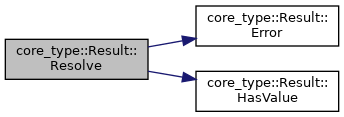
◆ Value() [1/2]
|
inlinenoexcept |
Access the contained value.
This function’s behavior is undefined if *this does not contain a value
- Returns
- T && An rvalue reference to the contained value
Definition at line 256 of file result.h.
References core_type::Result< T, E >::storage_.
◆ Value() [2/2]
|
inlinenoexcept |
Access the contained value.
This function’s behavior is undefined if *this does not contain a value
- Returns
- const T & A const reference to the contained value
Definition at line 248 of file result.h.
References core_type::Result< T, E >::storage_.
Referenced by core_type::Result< T, E >::MapError(), and core_type::Result< T, E >::Ok().

◆ ValueOr() [1/2]
|
inlinenoexcept |
Return the contained value or the given default value.
If *this contains a value, it is returned. Otherwise, the specified default value is returned, static_cast’d to T
- Template Parameters
-
U The type of defaultValue
- Parameters
-
[in] defaultValue The value to use if *this does not contain a value
- Returns
- T The value
Definition at line 391 of file result.h.
References core_type::Result< T, E >::HasValue().

◆ ValueOr() [2/2]
|
inlinenoexcept |
Return the contained value or the given default value.
If *this contains a value, it is returned. Otherwise, the specified default value is returned, static_cast’d to T
- Template Parameters
-
U The type of defaultValue
- Parameters
-
[in] defaultValue The value to use if *this does not contain a value
- Returns
- T The value
Definition at line 376 of file result.h.
References core_type::Result< T, E >::HasValue().

Member Data Documentation
◆ storage_
|
private |
Storage to contain value of type T or error of type E.
Definition at line 446 of file result.h.
Referenced by core_type::Result< T, E >::EmplaceError(), core_type::Result< void, E >::EmplaceError(), core_type::Result< void, E >::EmplaceValue(), core_type::Result< T, E >::EmplaceValue(), core_type::Result< T, E >::Error(), core_type::Result< void, E >::Error(), core_type::Result< T, E >::HasValue(), core_type::Result< void, E >::HasValue(), core_type::Result< T, E >::operator*(), core_type::Result< T, E >::operator->(), and core_type::Result< T, E >::Value().
The documentation for this class was generated from the following file:
- /home/runner/work/diag-client-lib/diag-client-lib/diag-client-lib/lib/platform-core/core/include/result.h